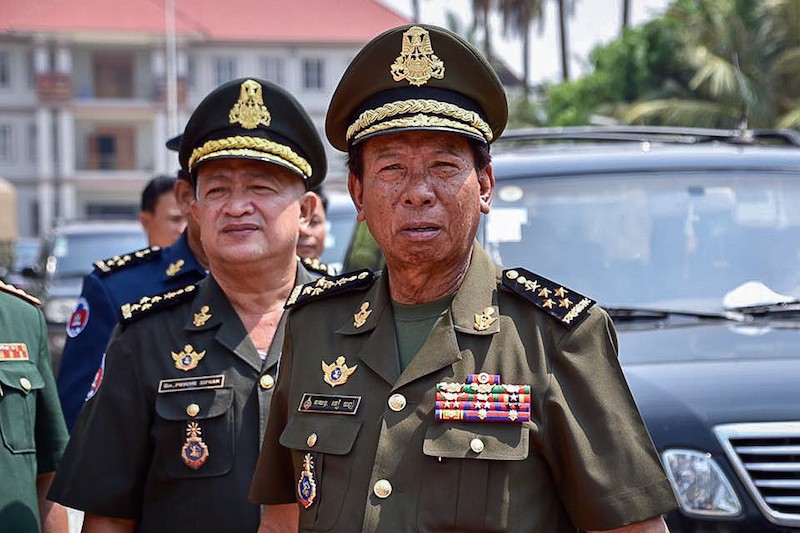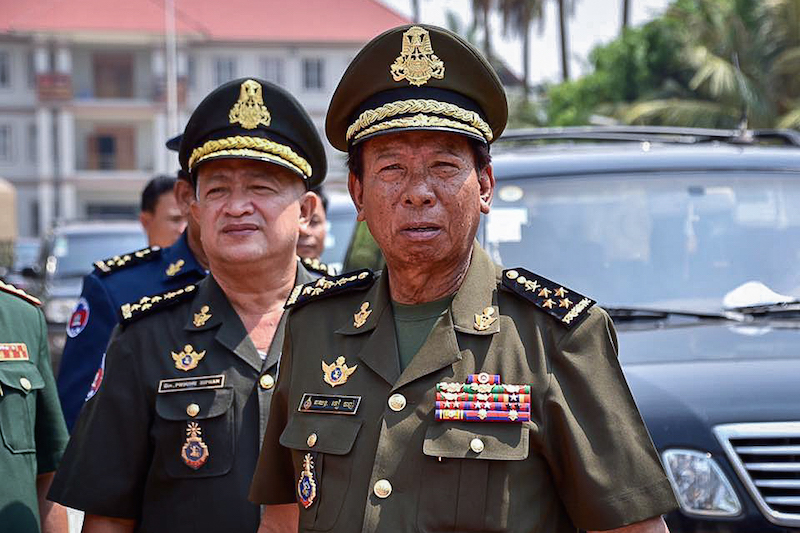Defense Minister Tea Banh yesterday used a speech in Phnom Penh to accuse the opposition CNRP of planning a putsch and threatened to arrest anyone who protested without permission—in apparent contradiction of the law.
General Banh, a member of the ruling CPP’s exclusive Standing Committee, went on his latest attack against the government’s critics at the inauguration of a new meeting hall at the National Defense University.

“They want to topple the legitimate government,” he said of the CNRP. “Speaking honestly, they want to overthrow the government that is led by the CPP, or overthrow the CPP.”
“We have one thing to say to anyone who creates obstacles to our work,” he added. “We will take measures.”
The general’s threats come amid a wave of arrests of opposition lawmakers and supporters and, most recently, human rights workers on a raft of accusations and charges widely seen as politically motivated.
Over the past few weeks, authorities have shown particular zeal in going after a “Black Monday” protest movement calling for the release of four rights workers and an election official charged over a sex scandal involving CNRP Vice President Kem Sokha.
Gen. Banh said the protesters were not barred from wearing the black shirts that have come to distinguish them but insisted that they needed the government’s permission before staging any event.
“What is Black Monday?” he said. “If you want to protest, it is OK. But you have to ask for permission. Ask for permission, and it will either be allowed or not allowed. It is at the discretion of the people in charge of the venue. If you do it illegally, you will be arrested.”
But critics and rights groups say the government is abusing the rules.
The 2009 Law of Peaceful Assembly requires protesters to notify authorities of their event. It does not say that authorities must approve the event before it happens.
The law says authorities only need to acknowledge receiving the notice and that they can only reject plans if they fall on a handful of public holidays or pose a serious safety or security threat.
When protesters asked the government to demonstrate on what turned into the first Black Monday event on May 9, authorities turned them down, claiming their peaceful plans amounted to “urban rebellion.” Eight people were arrested when the event went ahead anyway but were released by the end of the day.
The protesters say the black shirts were chosen to symbolize their mourning for the arrested rights workers and election official and for a broader deterioration of human rights in Cambodia. The government says their choice is an unbearable reminder of the Khmer Rouge.
Sok Sam Oeun, a prominent human rights lawyer, said the government was clearly misinterpreting the Law on Peaceful Assembly.
“It means we only give the notice,” he said. “But the way the government and the Phnom Penh municipality interpret, it is permission.”
He said some of the government’s more common reasons for ordering a stop to politically charged protests were rather poor, especially when a planned march is involved.
“They say it is a threat to public order or it affects the traffic, but I think if the police can arrange the march, the government can do it,” he said. “But right now everything is changed.”




